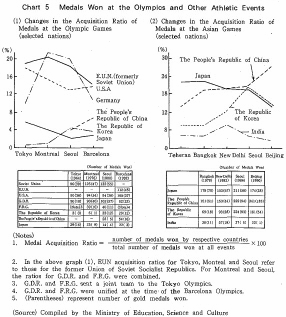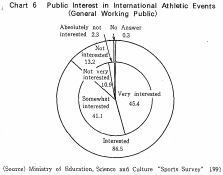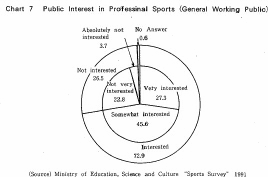| Home > Policy > White Paper, Notice, Announcement > White Paper > JAPANESE GOVERNMENT POLICIES IN EDUCATION,SCIENCE AND CULTURE1991 > PART |
||
Generally speaking, the main purpose of competitive sports is to raise the level of athletic competition. Faster, higher, stronger, more graceful and beautiful -- all of these are goals to strive for. The performance of top-levelv athletes at the Olympic Games is representative of competitive sports. The expression, "sports-for-all," which is often used in contrast to competitive sports is a general term which usually refers to pleasurable daily sports activities throughout peoples' lives.
Competitive sports and "sports-for-all" work in tandem towards
the overall promotion of sports. Promotion of competitive sports, in addition
to contributing to the formation of a positive looking and vigorous society.
Also exerts a considerable impact on the promotion of "sports-for-all".
Participation by Japan's athletes in the Olympics and other international games serves to stimulate the public interest and motivation for taking part in sports, especially in the case of young people. It also furthers the spread and promotion of sports throughout the country, contributing to the formation of a robust. forward looking and active society.
In recent years, the world's athletic competitive level has markedly risen, most notably in the emergence of Asian and African nations. Japan's competitive level has suffered a relative decline. It has become increasingly more difficult for Japan's athletes to bring home medals in Olympic and other international competitions. This drop in performance by Japan's athletes has been especially apparent since the 1988 Seoul Olympics and the 1990 Asian Games in Beijing.
A number of factors can be considered as responsible for this relative downward trend in the nation's competitive strength. Among these are: 1)difference in size and strength between Japanese athletes and those from other nations 2) Japan's slow response in applying the results or sports science towards strengthening the nation's athletes 3) deficiencies in providing a coherent system of training and guidance for athletes beginning from early years and 4) lack or a support system for athletes, coaches and the treatment of athletes upon their retirement from competition. It is hoped that positive measures will be taken for dealing with these problems.
During these times, however, Japan's athletes also brought home a total of 7 medals (1 gold, 2 silver and 4 bronze) from the 16th Winter Olympic Games held in Albertsville, France in February of 1992. This collection of medals equaled the total number of medals won by Japan in all previous Winter Olympic Games, Furthermore, Japan's performance at the 25th Olympic Games held in Barcelona, Spain from July to August in the same year put a halt to the recent downward trend in Japan's competitive strength with a total of 22 earned medals (3 gold, 8 silver, 11 bronze).
The list of future international competitions to be held in Japan includes the 1998 Nagano Olympic Winter Games, the 1994 Hiroshima Asian Games and the Universiade to be held in Fukuoka in 1995. An increase in the nation's competitive strength is expected as a result of the challenges from these upcoming events.

According to the results of the Sports Survey, 86.5% of the public showed interest in the nation's athletes' performance at the Olympics and other international competitions.

Also, 84.7% of the public agreed that a strong performance by Japan's athletes at international competitions provides a positive influence by stimulating average citizens' sports activities.
Moreover, according to public opinion on whether public and
social assistance should be given for Japan's athletes to participate in international
athletic events, 44.8% agreed that "positive support should be given" and another
43.7% answered that "some degree of support should be given. "In other words,
a total of over 90% agreed that assistance was necessary. In terms of concrete
items needing support, results from the Physical Strength and sports Survey (October
1991) by the Prime Minister's Office showed that among those respondents who
agreed that "public support should be given," approximately 60% answered "financial
support for training and sending athletes abroad." A significant number of respondents
also pointed out the need for building improved training facilities in Japan.
In line with the nation's plans to host the Nagano Olympic Winter Games and a
series of other international athletic events in the coming years, over 90% of
the respondents approved the hosting of such international athletic events in
Japan. These results indicate that the Japanese public has a great interest in
international exchange through sports and in the skills of the world's top level
athletes.
In Japan, sports promotion is largely divided between two organizations, the Japan Amateur Sports Association, which promotes sports primarily at the national level and the Japanese Olympic Committee which is mainly concerned with raising the level of international competitiveness. The Ministry provides national funding for both of these groups and other central athletic associations for respective sports in support of enriching their programs for the promotion of competitive sports such as strengthening athletes.
More specifically, the Japanese Olympic Committee carries out the following: l) training camps and other activities for strengthening athletes 2) international exchange activities including assistance for sending teams of athletes to the 25th Olympic Games in Barcelona, Spain (1992) and to the upcoming 1993 Winter Universiade in Zakopane, Poland 3) national assistance is provided for sending sports leaders and coaches abroad for training and other activities. Nationally funded programs carried out by the Japan Amateur Sports Association include:
l) Training for social-physical education leaders including those engaged in raising the competitiveness of the nation's athletes 2) Activities for fostering junior athletes 3) Survey research on sports medicine and sports science 4) Exchange programs with junior athletes from Asian nations 5) O.D.A. related cooperative programs including those for sports promotion activities for overseas youth.
Moreover, the Sports Promotion Fund, established in December of 1990, supports athletic associations and individual top-level athletes, coaches and leaders thus helping to raise the competitive level of the nation's athletes. With the working profits from the Fund, assistance is given to sports associations for carrying out intensive training for athletes and for hosting national and international scale athletic events and also to individual athletes, leaders and coaches for their sports activities. Together with national support, the Sports Promotion Fund is playing a vital role in sports promotion.
Hereafter, it is earnestly hoped that the Japanese Olympic Committee
and the Japan Amateur Sports Association will fully carry out their respective
missions and cooperate increasingly towards the goal of increasing the spread
and promotion of sports in Japan. The Ministry endeavors to provide appropriate
assistance, guidance and advice for these associations.
In order to raise competitiveness, it is important to scout talented athletes at an early stage and provide them with continued guidance and training from a long or medium term perspective. With this in mind, the nation's prefectures, with the cooperation of prefectural amateur sports associations, are holding training camps and dispatching coaches for lower and upper secondary school students. The Ministry provides financial assistance to these types of activities for raising competitiveness of junior athletes at the prefectural level.
Furthermore, from the viewpoint of stimulating prefectural level
programs for strengthening athletes a system has been established whereby those
persons making a significant contribution to the improvement and promotion of
competitive sports for Japan, i.e., athletes who placed 3rd or higher at the
Olympic Games, athletes who broke world records at international athletic events
or those with other outstanding skills or unusual experiences are commissioned
as distinguished special sports advisors and are dispatched to prefecture sponsored
sports programs or activities as advisors, etc. (As of 1992, 24 members representing
14 sports have been commissioned.)
In order to improve policies for raising competitiveness in athletics it is extremely important to reflect the opinions of athletes and others direct from the playing field. For this reason a system for commissioning Sports Advisors for the Ministry of Education, Science and Culture has been in operation since 1989. These advisors are persons who have made contributions toward improving competitive snorts such as former Olympic medalists or world class champions. They should also be actively engaged in training new leaders and coaches upon their retirement from active competition. These advisors periodically offer their opinions based on years of valuable sporting experience to the Ministry and those opinions are taken into consideration in furthering national policy for raising international competitiveness. As of 1992, eight advisors have been commissioned and they are providing valuable advice.
In order to improve competitive sports the securing and training of high quality leaders and coaches is an important task. The accreditation of programs for the training and qualification of social-physical education leaders established by the Ministry in January of 1987 includes as one of the areas of accreditation, training for leaders and coaches who are working to enhance competitiveness among athletes (competitive sports trainers).
Also, as of April 1992 the Ministry has been accrediting training programs conducted by sports associations for competitive sports trainers (advanced, intermediate or beginning levels) in 27 sports including track and field.
The Ministry provides subsidies to the Japanese Olympic Committee and other sports associations for support and training programs for coaches such as establishing new coaching positions, holding lectures, etc., so that coaches can securely go about their work in training athletes. The Sports Promotion Fund also provides support to sports activities for athletic leaders and coaches.
In addition, the Ministry is providing a forum for coaches,
researchers in sports medicine and science, and prefectural sports administrators
and others engaged in training and reinforcement programs for athletes. The National
Summit Meeting of Sports Coaches has been held since 1990 with the purpose of
bringing the above sports specialists together to share information and discuss
research on a variety of issues related to the various fields represented and
to create a system for invigorating sports based on improving mutual understanding,
cooperation and coordination among coaches and researchers.
In order to cope with the recent marked increase in the world's competitive standard in athletics, it is necessary to strengthen the nation's athletes in a scientific, systematic and organized manner. According to the results of the previously mentioned questionnaire from the Prime Minister's Office ("Physical Strength and Sports Survey") a comparatively large segment of the public agrees that "it is necessary for the national government to construct substantial training facilities." Considering these viewpoints the National Council on Educational Reform and the Consultative Committee on Sports Promotion (a consultative committee for the Prime Minister) and other organizations, have pointed out that the nation is lagging- behind in sports science and sports medicine and have proposed that construction of a national research institute for sports science and medicine and a national training center are urgently needed to close this research gap and increase the nation's competitiveness in athletics.
With these proposals in mind the Ministry is presently continuing
to make arrangements for the establishment of a "National Center of Sports Science" (tentative
name). It is proposed that this Center be established as an institute of the
National Stadium and School Health Center of Japan (special legal corporation)
with the goal of providing a place for scientific physical training and research
on sports science in order to raise Japan's competitive level in sports. Studies
are also continuing on the long-term prospects for a planned national training
center. Such a center would be an integrated facility with sports grounds, fields,
courts, gymnasiums, pools and other training facilities for a wide range of sports
as well as overnight facilities.
The National Athletic Festival or "Kokutai" is an inter-prefectural competition and the nation's major comprehensive athletic event. Held annually since the First National Athletic Festival in 1946 as a "people's sports festival," it plays an important role in national sports promotion.
From the 10th Annual Festival in 1955 and up to its present sponsorship this event has been jointly sponsored by the Japan Amateur Sports Association, the national government and the host prefecture. In 1987, at the 42nd Annual Festival, (Winter events -- Nagano Prefecture, Summer and Fall events -- Okinawa Prefecture) the Annual Festival completed its 1st full round of the nation's prefectures. The 2nd round of the prefectures began with the following 43rd Annual Festival (Winter events -- Gunma and Iwate Prefectures, Summer and Fall events -- Kyoto) The Japan Amateur Sports Association has taken responsibility for examining the prospects for holding the games since the start of the 2nd round. A policy for attempting to involve a wider range of citizens in the upcoming games has been worked out and the following changes have been made: simplification and rationalization of preparations and management, formation of a second Adult Division, participation by lower secondary school pupils, simplification of scoring methods and other changes as well.
In order for the National Athletic Festival to better attain
its goals and carry out appropriate management, the Ministry arranged a conference
of Japan Amateur Sports Association and related prefectural representatives in
June of 1990 for furthering mutual communication and contacts.
Spectator sports such as professional baseball, sumo, golf and other professional sports are followed and supported by a wide range of citizens. They play a particularly significant role in deepening young peoples' interest and concern and popularizing sports, moreover, the high level skills of professional athletes contribute to raising competitiveness in athletics. The social significance of professional sports is considerable.
According to the Sports Survey a high level of interest among the general public can be inferred. In fact, 72.9% of the respondents stated that they were interested in professional sports

Also, professional sports are a prime topic of the mass media
and the accomplishments of professional athletes affect the promotion of sports
activities among the general public. When asked about the effect of professional
sports, 44% of the sample replied that it "stimulated participation in and enjoyment
of sports activities," 29.6% replied that "as a form of amusement it helped to
pass the time" and 12.0% replied that it "raised the level of sports skills and
techniques among the public." In total, 85.5% of persons surveyed acknowledged
some effect from watching professional sports.
Recently, at the Olympic Games and other international events,
participation by professional athletes in certain sports events has been approved.
The provision in the Olympic Charter regarding eligibility to participate in
the Olympic Games was amended with abolishment of a rule which prohibited professional
athletes from competing. Now, professional athletes are able to participate pending
approval by various International Athletic Federations (I.F.) which have general
control over individual Olympic events. This change led the way to professional
athletes' participation in soccer, basketball and tennis at the 25th Olympic
Games held in Barcelona, Spain (1992). Moreover, participation by professional
ice hockey players was approved for the Winter Games. As previously described,
the circumstances surrounding sports have changed and the need for an increase
in cooperation and coordination between amateur and professional sports has become
more acute.
The November 1989 report from the Health and Physical Education Council delineated the necessity of the following points for promoting the healthy development of professional sports.
l) Examining the prospects for building an organization which would contribute to the healthy overall development of professional sports.
2) Furthering policy for raising the social prestige of professional sports.
3) Improving the coordinated strengthening of athletes through information sharing and cooperative research and consultation between amateur and professional sports coaches, sports leaders and sports scientists.
Taking these recommendations into account, the Ministry is actively taking up the challenge of formulating a policy for supporting the healthy development of professional sports.
First, in February of 1990 the establishment of the Japan Professional Sports Association (J.P.S.A), a governing organization for professional snorts. was approved. Associations representing a range of professional sports take part. Their cooperation and coordination leads to the enhancement of various projects for improving sports in Japan and contributes to the overall development of professional sports.
Second, the system for granting public awards to distinguished amateur sports figures was expanded to include professional sports figures as well. Since 1990 the Minister of Education, Science and Culture has been granting awards to those persons making a significant contribution to the development of professional sports. As of January 1992, ten professional athletes have been honored with these awards.
In addition, since 1991 the Ministry has supported a professional golf tournament providing a "Minister's Cup" to the winner.
By 1994, a professional soccer league is projected to start up. Such a league aims at: raising the standard of competitiveness in the sports through "professionalization," fostering the development of regionally based club teams in the style of those in Western Europe; thus promoting and spreading the sport of soccer in a wider range of levels, from community up to the professional level. The Ministry approved the establishment of a governing body for the future professional soccer league as a legal corporation in November of 1991 and provides the necessary advice and guidance so that professional soccer can take its place among the public as a new professional sport in Japan.
In that professional sports are of great significance in promoting sports overall, the Ministry endeavors to support its continuous healthy development.
| Back to Top | MEXT HOME |